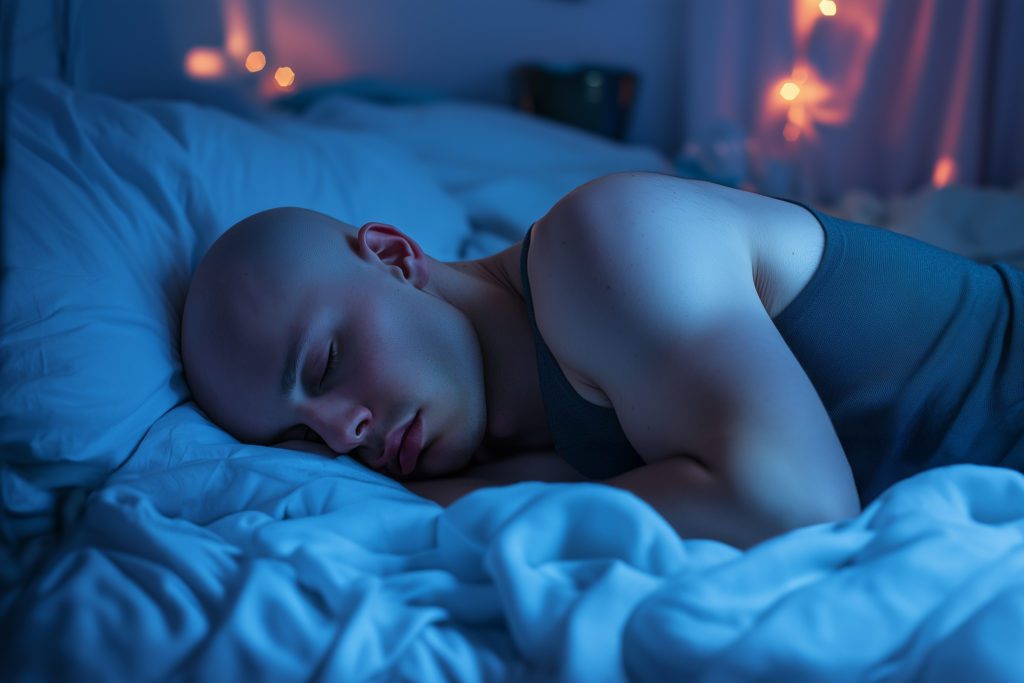
Managing Chemotherapy Insomnia for Breast Cancer Patients
Use these tips for managing chemotherapy insomnia for breast cancer patients if you can't fall asleep after chemo treatments.

Insomnia is a major concern in breast cancer patients. Between 20% and 70% of newly diagnosed or recently treated breast cancer patients experience insomnia. Experts believe that cancer-related insomnia can be caused by the stress of a breast cancer diagnosis, the breast cancer itself, or certain breast cancer treatments. For example:
- The stress and anxiety that accompany a breast cancer diagnosis can disrupt sleep.
- Some chemotherapies and targeted therapies are linked with insomnia. Research shows radiotherapy and chemotherapy are associated with sleep disturbances. For people who had insomnia before treatment, multiple side effects of these treatments may worsen symptoms. Glucocorticoids that are often prescribed in the supportive care of cancer patients are known to alter the sleep–wake cycle through disruption of the cortisol rhythm.
- If a woman enters menopause either naturally or as a result of treatment during cancer therapy, this could trigger menopause-related insomnia. Between 40% and 60% of women experience insomnia during menopause.
While it's normal for people to occasionally struggle with sleep, insomnia is a chronic sleep disorder that can make it difficult to fall asleep or stay asleep. Insomnia is a condition that dramatically reduces quality of life. It is linked with increased risks for anxiety and depression, high blood pressure, heart disease, diabetes, obesity, and other medical conditions. Here are some tips for managing insomnia during chemotherapy treatment for breast cancer.
Managing Insomnia During Chemotherapy for Breast Cancer
First, it's important to bring any concerns you're having about your sleep quality to your doctor. Based on your treatment protocol, your doctor may be able to alter or replace your current medication(s). Several hormonal therapies and targeted therapies have been linked with insomnia including anastrozole and exemestane.
Some pain medications that are prescribed during breast cancer treatments can also cause insomnia. Ask your doctor about specific side effects of any medications or therapies you're currently using to determine if your insomnia is caused by your treatment protocol. In some cases, other factors outside of treatment could be causing insomnia.
There's a lot that feels like it's out of your control when you're fighting breast cancer. One thing you can control is your sleep hygiene. Here are some tips for coping with insomnia during treatment.
Reduce Exposure to Artificial Light
Did you know that scrolling on your phone before bed or falling asleep with the television on can greatly reduce sleep quality? Blue light emitted from screens actually suppresses melatonin production. Even light from nearby streetlights or the hallway outside your bedroom can make falling asleep harder.
Have Strong Rituals
Relaxation-inducing rituals can signal to your brains that it's time for rest. What "relaxes you" can look different than what relaxes someone else. Some tips for winding down at night include:
- Taking a warm bath
- Reading a book in low light
- Listening to relaxing music or nature sounds
- Focusing on peaceful imagery that includes snow-covered fields, gently rolling streams, peaceful pastures, or a favorite spot from your childhood
Make Sure the Temperature in Your Bedroom Is Comfortable
The ideal temperature for sleep in a bedroom is between 60 degrees Fahrenheit/15.5 degrees Celsius and 67 degrees Fahrenheit/19.4 degrees Celsius. This range promotes the REM sleep stage where our deepest, most replenishing sleep occurs.
Our core body temperature decreases as we fall asleep. Heat is a disruptor of REM sleep. When your bedroom is too hot, you may experience restless, fitful sleep. If a bedroom is too cold, your body may exert lots of energy to try to warm itself up while you're sleeping.
Start Journaling Before Bed
If you suspect that your insomnia is caused by the stress and uncertainty you're feeling as you go through breast cancer treatment, consider journaling before bed to "release" your thoughts. Research shows that journaling may help people to experience a greater sense of emotional well-being and improvements in how they feel physically. While there hasn't been much research done on the benefits of journaling for breast cancer patients specifically, research involving sarcoma patients found that participants who participated in journaling were more likely to report improved communication scores, symptom management, and quality of life.
Avoid Using Your Bedroom for Other Purposes
Bedrooms are for sleeping. If you're going through cancer treatments, you may be using your bedroom as your default relaxation and recovery zone. If possible, consider only using your bedroom for nighttime sleep. Moving all napping, resting, and relaxation to a couch in another room in the house can help you to draw a very important psychological divide between your bedroom and your "waking" hours.
Following this tip may require collaboration with other members of your household. When coming home from treatments or simply living the daily experience of being treated for cancer, there's no doubt that you need a quiet, comfortable place for rest. Your bedroom may currently be that default place simply because it has a comfortable place to rest and a door that locks. Work with your family or household members to create another space in the den, living room, or finished basement where you can "retreat" comfortably during non-sleep hours.
Manage Nausea
Nausea is a common side effect of chemotherapy. And, nausea can lead to insomnia if it occurs close to bedtime. Some things you can do to manage nausea include drinking fluids, eating bland foods that are easy to digest (avoid eating within three hours of bedtime), and trying relaxation techniques like progressive muscle relaxation (PMR). This exercise can also help you fall asleep. To do PMR, simply lie in your bed and relax all of your muscles. Then, starting at your toes, tense and relax your muscles one at a time. Work your way up to the top of your head. After you are finished, you should feel noticeably more relaxed.
Sleep Matters More Than Ever During Cancer Treatment
A 2022 systematic review on sleep during oncological treatment found that disrupted sleep and sleep-wake activity observed in cancer patients undergoing oncological treatment are often associated with aggravated symptom burden and diminished health-related quality of life that may compromise treatment adherence and effectiveness. In addition, the review found that disrupted sleep is linked to carcinogenic processes that could result in worse prognostic outcomes. It can be helpful to have an analysis of sleep duration and quality based on biological markers after you close your eyes for the night. Pillow is a sleep tracking app that can provide personalized insights to help you with insomnia. There's no need for special equipment. Simply use Pillow with your iOS device.

Written by
Emily Mendez
Emily Mendez is a former therapist and mental health author. She is one of the leading voices in mental health. Emily's writing has appeared in eCounseling, SonderMind, and more. Emily is frequently interviewed by Healthline, Fatherly, INSIDER, Family Circle, and other national media for her advice and expert opinion on the latest mental health topics.
Download Pillow
Get help
Press & News
Legal
Connect
X (Twitter)
Company
Copyright © Neybox Digital Ltd.



